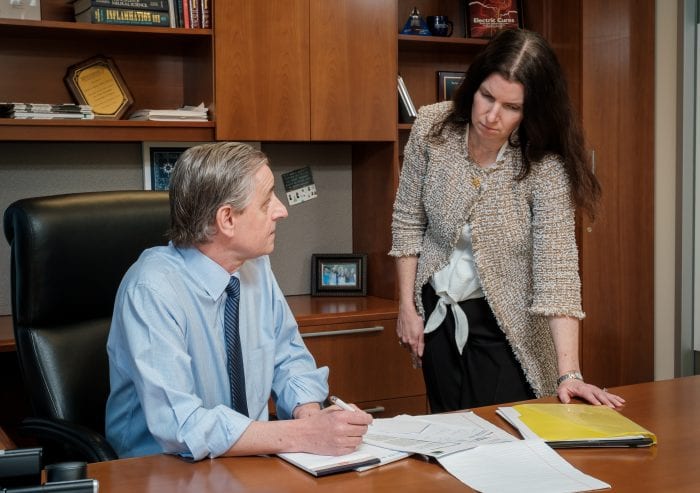By Daniel Dunaief
In a collaboration between Cold Spring Harbor Laboratory and Northwell Health’s Feinstein Institutes for Medical Research, doctors and researchers are seeking patients with mild to moderate symptoms of COVID-19 for an at-home, over-the-counter treatment.
The two-week trial, which will include 84 people who are 18 years old and older, will use a high, but safe dose of Famotidine, or PEPCID, in a double-blind study. That means that some of the participants will receive a placebo while others will get the Famotidine.
Volunteers will receive the dosage of the medicine or the placebo at home and will also get equipment such as pulse oximeters, which measure the oxygen in their blood, and spirometers, which measure the amount of air in their lungs. They will also receive a scale, a thermometer, a fitness tracker and an iPad.

Northwell Health will send a certified phlebotomist — someone licensed to draw blood — to the participants’ homes to collect blood samples on the first, 7th, 14th, and 28th day of the study.
The study is the first time CSHL and Northwell Health have designed a virtual clinical trial that connects these two institutions.
“What is very powerful with our work with Cold Spring Harbor Laboratory is the ability to do a virtual trial and utilize patient-recorded outcome measures,” said Christina Brennan, a co-investigator on the study and Vice President for Clinical Research for Northwell Health. “I’m thrilled that we’re doing this type of virtual trial. It’s very patient-centric.”
While reports about the potential benefits of Famotidine have circulated around the country over the last year, this study will provide a data-driven analysis.
“If we study this in the outpatient population, then we might have an opportunity to see if [Famotidine] really does play a role in the reduction of the immune overreaction,” Brennan said.
At this point, researchers believe the drug may help reduce the so-called cytokine storm, in which the immune system becomes so active that it starts attacking healthy cells, potentially causing damage to organs and systems.
In an email, Principal Investigator Tobias Janowitz, Assistant Professor and Cancer Center Member at Cold Spring Harbor Laboratory, wrote that “there are some retrospective cohort studies” that suggest this treatment might work, although “not all studies agree on this point.”
In the event that a trial participant developed more severe symptoms, Janowitz said the collaborators would escalate the care plan appropriately, which could include interrupting the use of the medication.
In addition to Janowitz, the medical team includes Sandeep Nadella, gastroenterologist at Northwell, and Joseph Conigliaro, Professor of the Feinstein Institutes for Medical Research.
Janowitz said he does not know how any changes in the virus could affect the response to famotidine.
In the trial, volunteers will receive 80 milligrams of famotidine three times a day.
The dosage of famotidine that people typically take for gastric difficulties is about 20 milligrams. The larger amount per day meant that the researchers had to get Food and Drug Administration approval for an Investigational New Drug.
“This has gone through the eyes of the highest regulatory review,” Brennan said. “We were given the green light to begin recruitment, which we did on January 13th.”
Volunteers are eligible to join the study if they have symptoms for one to seven days prior to entering the trial and have tested positive for the virus within 72 hours.
Potential volunteers will not be allowed in the trial if they have had other medications targeting COVID-19, if they have already used Famotidine in the past 30 days for any reason, if they have severe COVID that requires hospitalization, have a history of Stage 3 severe chronic disease, or if they are immunocompromised by the treatment of other conditions.
Brennan said Northwell has been actively engaged in treatment trials since the surge of thousands of patients throughout 2020.
Northwell participated in trials for remdesivir and also provided the steroid dexamethasone to some of its patients. The hospital system transfused over 650 patients with convalescent plasma. Northwell is also infusing up to 80 patients a day with monoclonal antibodies. The hospital system has an outpatient remdesivir trial.
“Based on all our experience we’ve had for almost a year, we are continuously meeting and deciding what’s the best treatment we have available today for patients,” Brennan said.
Janowitz hopes this trial serves as a model for other virtual clinical trials and is already exploring several potential follow up studies.
Brennan said the best way to recruit patients is to have the support of local physicians and providers.
People interested in participating in the trial can send an email to [email protected] or call 516-881-7067.
When the study concludes, the researchers will analyze the data and are “aware that information on potential treatments for COVID-19, no matter if the data show that a drug works or does not work, should be made available to the community swiftly,” Janowitz wrote in an email.
The decision to test this medicine as a potential treatment for COVID-19 arose out of a conversation between Director of the Cold Spring Harbor Laboratory Cancer Center Dave Tuveson and CEO of the Feinstein Institute Kevin Tracey.
“I got involved because I proposed and developed the quantitative symptom tracking,” Janowitz explained.





